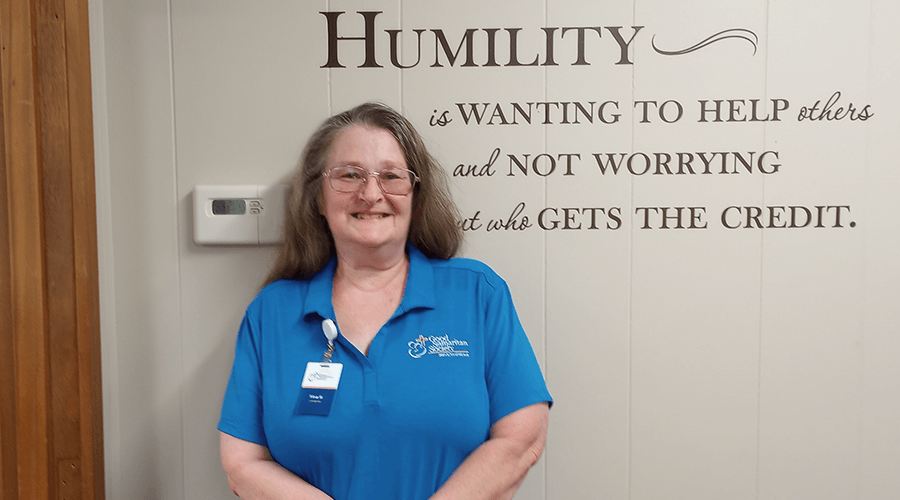In its hundredth year, the Good Samaritan Society is celebrating the people who make it a great place to live and work.
There are dedicated employees at every level of what we do, whether they work on one of our campuses or deliver care to homes in the areas we serve.
As a home-based caregiver in Clinton, Iowa, Tina D. Rodgers has spent the last six years bringing care to the homes of local seniors who need some support but prefer to live independently. She considers it her calling.
Accommodating all
Home-based caregivers like Rodgers are an integral part of the Good Samaritan Society’s mission, vision and values. They extend the Society’s footprint beyond its physical campuses. In this way, home-based caregivers make the Society a more flexible and accommodating organization.
The Society’s home-based services are split between medical and non-medical care. Our in-home medical services, known collectively as home health, can include medication management, physical, occupational and speech therapy, rehabilitation, wound care and more.
Rodgers provides non-medical services, known collectively as home care, which is more about addressing daily needs and helping seniors thrive in place.
Care through conversation
Rodgers normally makes two visits a week to help her clients with shopping, cooking, cleaning and bathing.
“We help them in all aspects of their lives,” she said. “We try to make life easier and more rewarding for them.”
She also spends time in conversation with her clients. Their chats often involve historical insights and moments of nostalgia.
“The history lessons are my favorite part of the job,” Rodgers said. “Some of my clients are from my hometown, so it’s neat to hear stories about Clinton from when they were young.”
She’s heard innocent stories of youthful shenanigans—one of her clients and his friends used to push trolley cars off the tracks in Clinton, for instance—as well as darker memories about the second World War, Vietnam and Korea.
As a caregiver to many veterans, Rodgers says the stories—and the work in general—can be a mixed bag of emotions.
“There are happy and sad stories, but I try to keep the focus on happy thoughts,” she said. “It’s an emotionally draining job sometimes. If you don’t have love for the job and the people you serve, it could probably overwhelm you.”
Rodgers said support from management and coworkers helps too.
“When it comes to being successful and happy in the work I do, it helps to have good management and friendships with my fellow caregivers,” she said. “After COVID-19 hit, I went through a rough period emotionally. They were part of my support system in the healing process.”
Despite the emotional toll of the job, Rodgers remains grateful that her clients share their stories and their lives with her.
“I feel very blessed that they trust me,” she said. “They just want to know they’re going to be remembered. I can help them share their legacy.”
God’s work
Rodgers knows exactly why she does what she does. She feels compelled toward the work of caregiving.
“I believe what I’m doing is a calling. It’s about serving God,” she said.
She thinks that shared view, with God at the heart of service, is what sets the Good Samaritan Society apart from other senior care providers.
“God told us to take care of the widows and the orphans—and part of that is the elderly too. Even if it’s just a conversation that makes their day better, it’s God’s work.”
Rodgers and her fellow caregivers do the work with the grace and compassion that every senior deserves.
“We love what we do. We’re in this to make people’s lives better and to help them prepare for the next stage, emotionally and spiritually,” she said.
Rodgers can’t imagine doing anything else.
“I’ve reached my destination. I’m where I’m supposed to be in life,” she said. “I see myself doing this forever.”

